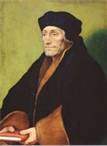Илияна Бенина, Магдалина Бенина, Никола Бенин
Desiderius Erasmus Roterodamus was a great friend of Sir Thomas More and Hans Holbein the Younger. A creative and prolific writer on Humanist topics and translator of Latin and Greek texts, his works were highly publicized in his time.
Erasmus was born in Holland in October of 1466, the illegitimate son of Gerhard (unknown last name) who later became a priest, and a woman named Margaretha Rogers, the daughter of a physician. They named him after Saint Erasmus of Formiae. After 1496, he added the surname Desiderius and he supplemented his scholarly name with Roterodamus, the Latinized version of the name for the city of Rotterdam.
Erasmus obtained one of the best educations available to a young man at the time. At the age of nine, Erasmus, his older brother Peter and their mother moved to Deventer to attend one of the best Latin schools in the Netherlands. The curriculum had recently been renewed and Greek was being taught for the first time at a level below university. While there, Erasmus learned of having a personal relationship with God but abstaining from the harsh rules and strict routines of monasticism. For the rest of his life, he attacked the excesses of monasticism.

His mother died in 1483 from the plague and his time in the school ended. By 1492, Erasmus was so impoverished he entered a monastery in Steyn where he took vows as an Augustinian priest. Soon after he was ordained, the Bishop of Cambray offered him employement as a because of his excellent skills in Latin and his reputation as a man of letters. He was given a temporary dispensation from his monastic vows due to his love of Humanistic studies and later Pope Leo X made the dispensation permanent.
In 1495, Erasmus began his studies at the University of Paris, in the College of Montaigu, a center of Reformist zeal. He graduated with a degree in theology and traveled to England where he met Thomas More, John Colet, John Fisher and other scholars and Humanists. He traveled to Italy from 1506 to 1509 where he studied at the University of Turin. While there, his interest in the New Testament was kindled. He became a professor of Divinity and resided at Queens College Cambridge from 1510-1515.
In 1512, he began his opus, a new Latin reworking of the New Testament. He collected all manuscripts he could find and began working on polishing the Latin. He also included a Greek text calling it “All of the New Testament” and it was published in 1516 in Basel, Switzerland. A second and third edition followed in 1519 and 1522. This third edition was probably used by William Tyndale for his translation of the New Testament into English of 1526 and by Robert Stephanus in his 1550 edition which was later used by translators for the King James Version of the English Bible. There were to be fourth and fifth editions of this work and he considered this to be his chief service to the cause of Christianity.

Erasmus carried on a correspondence with Martin Luther and for the most part, tried to remain neutral in reformation disputes. While Erasmus criticized practices of the Catholic Church and tried to eradicate abuses of the clergy, his primary goal was to return Catholics to the simpler faith of the apostolic era. He never condoned the Reformation and remained Catholic until his death.
He wrote many works ecclesiastical and humanistic, his most famous being “In Praise of Folly”, written in 1509 and published in 1511. It was dedicated to his friend Sir Thomas More and criticized European society, the Catholic Church and widely held superstitions of the time. He wrote in Latin but encouraged all his works to be translated. A testament to the popularity of his writings is the number of translations and editions which have appeared since their initial publication. There is no doubt he has been influential in learning from the time of his first writings to his death, down to the present day. Erasmus died of a sudden attack of dysentery on July 12, 1536, aged 69 and they buried him in the cathedral in Basel.

Няма коментари:
Публикуване на коментар